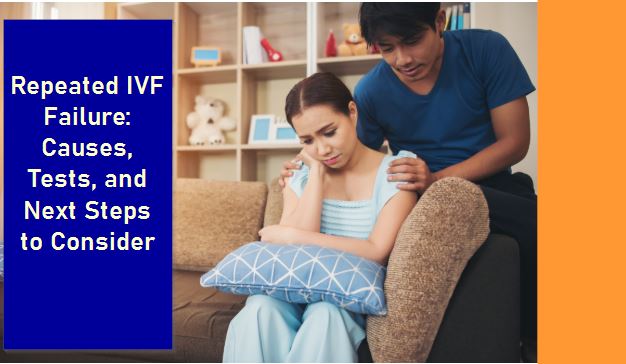IVF is the hope at the end of the long and hard tunnel that couples struggling to conceive are in. It is one of the most developed infertility treatments that has assisted millions of families in the world. What would happen with the failure of IVF?
In the case of some couples, the recurrent IVF failure has become a bitter reality that forces them to be depressed, confused, and not know what to do next. You are not the only one who is going through the failed IVF cycles. The reason is that, despite that, there are means to get to know what triggers it, how to deal with it, and increase your chances of success.
Why IVF May Fail Repeatedly
The most irritating part about IVF is that despite the high planning that is conducted before the process, it cannot be guaranteed that success will be achieved. Repeated failures may be caused by several factors:
- Quality and age of the woman: As the age of the woman increases, there can be higher chances of lower quality and quantity of the eggs. These types of eggs may lead to failure of implantation or non-implantation of embryos.
- Problem with sperm quality: Abnormal sperm count, shape, or motility also decreases the chance of success of fertilisation.
- Quality of embryo: Not all types of embryos can be viable even in well-developed laboratories. In some cases, they may be aborted due to chromosomal anomalies.
- Uterine problems: Problems in the uterus, like fibroids, endometrial polyps, adhesions, or unhealthy uterine lining, would disrupt the implantation.
- Immune or genetic factors: In some cases, the undiagnosed genetic factors or immune system issues lead to the IVF failure.
- Lifestyle factors: Stress and unhealthy diet, smoking, alcohol, and insomnia also affect the results of treatment.
Recurrent IVF failure does not imply that you have lost the battle, but it indicates that you need a more individualised approach. Know what to do after IVF Failure
Suggest to Read:- Which IVF Clinic Has The Highest Success Rate In Delhi?
What You Can Do After Repeated IVF Failure
In case of the various failed IVF cycles, the initial action is never to quit, but to review. The following are some of the key aspects:
- Obtain an elaborate medical history: Meet with your fertility specialist to discuss what may have failed to work in the prior cycles. Was it an ineffective medication response? Low-quality embryos? Or uterine receptivity? An in-depth analysis may offer some very useful information.
- High-tech diagnostic tests: In some instances, further examination, like genetic screening (PGT), hysteroscopy, or blood clotting examination, may be useful to identify the latent causes of IVF failure.
- Personalised care plans: Your doctor might suggest a more specific strategy to the same protocol, including different stimulation medications, ICSI, assisted hatching, or a donor egg/sperm, because this would be the situation in your case.
- Focus on lifestyle changes: Fertility can be enhanced a lot by nutrition, stress management, weight management, and smoking or alcohol cessation. Other therapies that can help to decrease the level of stress during treatment include acupuncture, yoga, and counselling.
- Psychological and emotional support: The unemployed IVF may be a strain on your psyche. Counselling or support groups can help one feel less lonely and more optimistic.
Success Is Still Possible
It should not be forgotten that when IVF fails several times, it does not imply that you are not going to have babies. Indeed, there are numerous cases when couples that have undergone several unsuccessful cycles finally conceive with the help of the appropriate medical practice. The following are some of the ways through which success can be realized in the wake of failure:
- Switching protocols: Some women are more amenable to mild protocols of stimulation, and others are more amenable to increased doses of medication. Sometimes a different approach is all that is needed.
- Use of donor eggs or sperm: Where the quality of eggs or sperm is the problem, donor programmes may greatly help to increase the success rate.
- Transfer of blastocysts: Transfer to blastocyst-stage embryos at day 5 can help to enhance implantation.
- Preimplantation Genetic Testing (PGT): Ensuring embryos are chromosomally normal can reduce the risk of implantation failure and miscarriage.
- Correcting uterine conditions: Treating different uterine conditions like fibroids, polyps, or hormonal imbalances can prepare a healthier environment for implantation.
The key point in working with an IVF centre is that it is willing to explore every possibility and design a treatment plan suited to your unique circumstances.
Staying Positive During the Journey
The emotional impact of IVF failure can truly be understood. Feelings of frustration, grief, and helplessness are always normal in women’s lives. However, staying positive and reluctant can help you stay resilient. Surround yourself with supportive family and positive friends, engage in different activities that bring joy, and remember that IVF is just one path—there are many medical options available today to help couples conceive.
Final Thoughts
Repeated IVF failures are undoubtedly painful physically and mentally, but they are not the end of your journey. They are signals that your treatment plan may need a different approach, more advanced testing, or care from a highly specialised team. Choosing the best IVF centre in Delhi can make all the difference in turning setbacks into success.
At Sehgal Nursing Home, the couples get not only the treatment but also complete support, transparency, and compassion. Our goal is to walk beside you through every step of your fertility journey and help you achieve the dream of parenthood with confidence.
